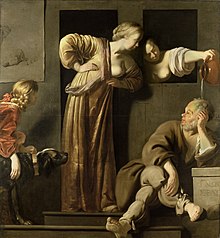
Myrto (/ˈmɜːrtoʊ/; Greek: Μυρτώ; fl. 5th century BC) was, according to some accounts, a wife of Socrates.
Sources
The original source for the claim that she was Socrates' wife appears to have been a work by Aristotle called On Being Well-Born, although Plutarch expresses doubt that the work is genuine. She was apparently the daughter, or, more probably, the granddaughter of Aristides. A different account of Xanthippe and Myrto is given in Aristoxenus's Life of Socrates written in the latter part of the fourth century BC that Aristoxenus asserts is based on first-person accounts by his father. This claims that Myrto was his legitimate wife and Xanthippe his mistress, whose child became legitimate.
Although Diogenes Laërtius describes Myrto as Socrates' second wife living alongside Xanthippe, Myrto was presumably a common-law wife, and Plutarch describes Myrto as merely living "together with the sage Socrates, who had another woman but took up this one as she remained a widow due to her poverty and lacked the necessities of life." Athenaeus and Diogenes Laërtius report that Hieronymus of Rhodes attempted to confirm the story by pointing to a temporary decree the Athenians passed:
For they say that the Athenians were short of men and, wishing to increase the population, passed a decree permitting a citizen to marry one Athenian woman and have children by another; and that Socrates accordingly did so.
— Diogenes Laërtius, ii. 26
Neither Plato nor Xenophon mention Myrto, and not everyone in ancient times believed the story: according to Athenaeus, Panaetius "refuted those who talk about the wives of Socrates."
The story has generally not been believed by modern scholars, though some have accepted it – for instance J. W. Fitton, who argues that Myrto was Socrates' wife whereas Xanthippe was a citizen pallake ("concubine").
Notes
- ^ Athenaeus, xiii. 555D–556A
- ^ Plutarch, Aristides, xxvii. 3–4
- ^ Diogenes Laërtius, ii. 26
- Huffman, Carl (2012). Aristoxenus of Tarentum. New Brunswick, N.J: Transaction Publishers. ISBN 978-1-315-08215-8. OCLC 777330122.
- Luis E. Navia (1985), Socrates, the man and his philosophy, p. 78
- Nails, Debra (2002). The People of Plato: A Prosopography of Plato and Other Socratics. Hackett. p. 209. ISBN 978-0-87220-564-2.
- Fitton, J. W. (1970). ""That was no lady, that was..."". Classical Quarterly. 20 (1). JSTOR 637508.
Further reading
- Fitton, J. W. (1970). "'That Was No Lady, That Was...'". The Classical Quarterly. 20 (1): 56–66. ISSN 0009-8388. JSTOR 637508.
- Woodbury, Leonard (1973). "Socrates and the Daughter of Aristides". Phoenix. 27 (1): 7–25. doi:10.2307/1087907. ISSN 0031-8299. JSTOR 1087907.
